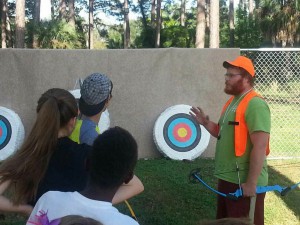by ewestbrook | Apr 24, 2015
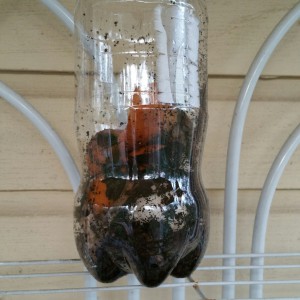
A two liter soda bottle with the top cut off makes a great mini compost bin. This is a a new batch with soil mixed in to experiment with jumpstarting the composting process.
With the promise of fresh vegetables just around the corner, now is a great time to think about starting a compost pile to save money on fertilizer and potting soil for your garden. Composting makes an excellent (and environmentally friendly) project for youth. It can save you money on commercially sold soil amendments as well as improving the quantity and quality of your vegetable harvest. Compost is simply organic material that has been broken down by living organisms until it can be used by plants as nutrients. This decomposed material is called humus and it is a great natural fertilizer. All that you need to get started composting are a few key ingredients:
- An even mix of nitrogen rich “green” organic materials and carbon rich “brown” organic materials. Greens include items like fresh grass clippings, manure and vegetable scraps from the kitchen. Browns are things like dead leaves, straw, or newspaper.
- Moisture is needed for the organisms that break the compost down to live, but not too much. The pile should be damp, not soggy.
- Air should be introduced to the compost periodically by mixing it up.
- Time is necessary for microorganisms to turn the brown and green materials into humus.
There are several methods of composting, from something as simple as a pile in a corner of your yard to a commercially sold rotating bin. Whatever composting system your group chooses the basic method of creating a good composting mixture is the same. Simply make even layers of browns and greens and moisten the pile slightly with water. Over the course of the next few weeks, microorganisms will begin decomposing the mixture, releasing heat as a byproduct. Temperatures will sometimes to as high as 140° F. The mixture will reduce in volume by nearly half as it breaks down. Once the mixture is entirely composted it will be close to ambient temperature and will resemble fine dark rich soil with some large clumps. To test the compost, plant a few fast growing radish seeds in it. If they don’t grow or are unhealthy it means bacteria are still decomposing the compost mixture and competing with the plants for nutrients. If the plants are healthy the mixture is ready to use in the garden either by spreading it like a mulch, mixing it into the soil or making a compost tea.

A two liter soda bottle with the top cut off makes a great mini compost bin. This is a a new batch with soil mixed in to experiment with jumpstarting the composting process.
As an alternative to a large compost pile or bin you can create mini compost mixtures in a variety of recycled containers, such as a mason jar or empty 2-liter bottle. These are great for small classroom projects, science experiments and take home projects. Make sure to that the compost can be mixed and is getting air. Keep it in a sunny spot so it is warm enough for the microbes to work. Here are some ideas to extend this activity into a project to learn the science behind composting:
- Help youth research composting methods and choose the best one for them. Encourage them to consider things like cost, labor and time when deciding the best method.
- Try different types of composting methods and mixtures. Have the youth make predictions about which mixture will be the most effective. Have them design an experiment to find out what happens if more greens are in a composting mixture than browns? Or, why would one method decompose faster than the other? What is the fastest method of composting?
- Keep records and observations about the compost as it decomposes. By measuring factors like temperature, texture, smell and look youth learn the value of recordkeeping as they use the data they collected to research the best composting methods.
- Have the finished compost soil tested. Ask your county 4-H Agent to invite a UF/IFAS Agriculture or Horticulture Agent to help perform the test and explain the results to the group.
For more resources to help your club or group to learn composting by doing visit these sites:
Do you have a passion for gardening that you would like to share with others? Last year, nearly 20,000 youth participating in the 4-H Gardening Project. This would not have been possible without our 4-H volunteers. If you would like to help the next generation develop gardening skills and an appreciation for agriculture and the environment, consider becoming a volunteer. To find out more, contact your local UF IFAS Extension Office, or visit http://florida4h.org/volunteers.
Your opinion matters! Take this short survey to help us improve our blog https://ufl.qualtrics.com/SE/?SID=SV_3gtLKjqia3F75QN.
by Whitney Cherry | Apr 17, 2015
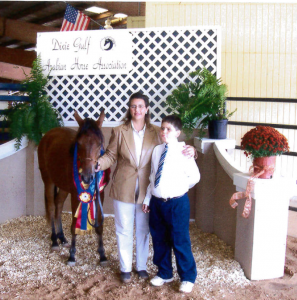
Dr. Williamson helping a 4-Her at a show
There are many reasons why 4-H has stood the test of time for more than 100 years. In addition to its link with land grant universities, 4-H is family friendly and available in every state and every county in the US (and even some foreign countries like Korea, Cuba, Germany and Italy). In fact, you can be a lifelong participant in 4-H- first as a youth member, then as a collegiate 4-H member, and later as an alumni or volunteer. Dr. Reese Williamson is a great example of how to turn a 4-H experience as a youth into a lifelong passion. She joined 4-H in 1974, in McKean County, Pennsylvania and was active in horse clubs, livestock clubs, downhill ski clubs, and even a square dancing club! As a teen, she fine-tuned her communication and leadership skills as a member of the 4-H County Council, which later led to a summer internship as the 4-H Assistant to the County agent. “My 4-H Extension Agent in Pennsylvania was a motivator and wrote recommendation letters for me for college and vet school,” says Dr. Williamson. “I have been involved in 4-H since 1974 with the exception of the five years while I was in vet school. As soon as I moved to Florida, I looked up my local county Extension Office to become a volunteer.”
When asked why she decided to extend her 4-H involvement as a volunteer, she says “I enjoy that there is a place for everyone [in 4-H]. I enjoy sharing the joy of learning and of livestock and horses with youth. It’s important that youth know where their agricultural products come from, that they respect animals and the impact they have on the environment. I want them to have a positive experience with horses and other animals.”
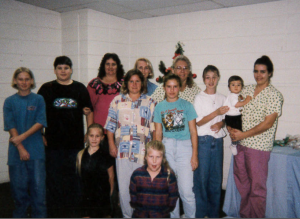
Dr. Williamson with members and alumni of her 4-H club
Without volunteers like Dr. Williamson, many youth would not have opportunities to learn about agriculture or develop life skills such as responsibility, confidence, and compassion. She shares, “It’s challenging to be a youth volunteer in today’s society. Most youth are from single-parent families. Children are living in two homes with multiple parents and grandparents often creates scheduling conflicts, but we must put the children first- they are the priority. It’s important to me to never disappoint or extinguish a child’s enthusiasm. If a child works towards a goal, it’s important that they are not prevented from completing that goal because of a scheduling boundary.”
Dr. Williamson’s passion for helping youth has had a tremendous impact on the Okaloosa 4-H Program over the past 25 years. Many of her members have become teen volunteers and later, as adult 4-H Alumni, come back to volunteer.
Kyle Godwin, an Okaloosa 4-H Alumni says, “Over the years of being in Dr. Williamson’s 4-H club, both as a member and then as the Club President , she laid many building blocks for me from public speaking to proper animal husbandry. She is always willing to go out of her way to help a new kid get started raising animals.” Another 4-H Alumni, Nathan Moores, shares: “Dr. Williamson has been a dedicated volunteer throughout my 4-H experience and we are blessed to have her. She has gone out of her way to help me and my fellow 4-Hers with our projects, whether it was husbandry questions, vaccinations, or health certificates.”
Do you have a passion or skills that you would like to pass on to the next generation of parents, employees, civic leaders, and decision makers? Dr. Williamson’s advice to anyone considering getting involved is: “Step up and volunteer! With 4-H, you can have a positive influence on our next generation of citizens. It is definitely worth squeezing the time into your schedule.” You don’t have to be a 4-H Alumni or a veterinarian to volunteer. 4-H needs caring adults from a wide variety of backgrounds, skills and experiences. For more information, contact your local UF IFAS Extension Office, or visit http://florida4h.org/volunteers.
Your opinion matters! Please take this short survey to help us improve our blog https://ufl.qualtrics.com/SE/?SID=SV_3gtLKjqia3F75QN
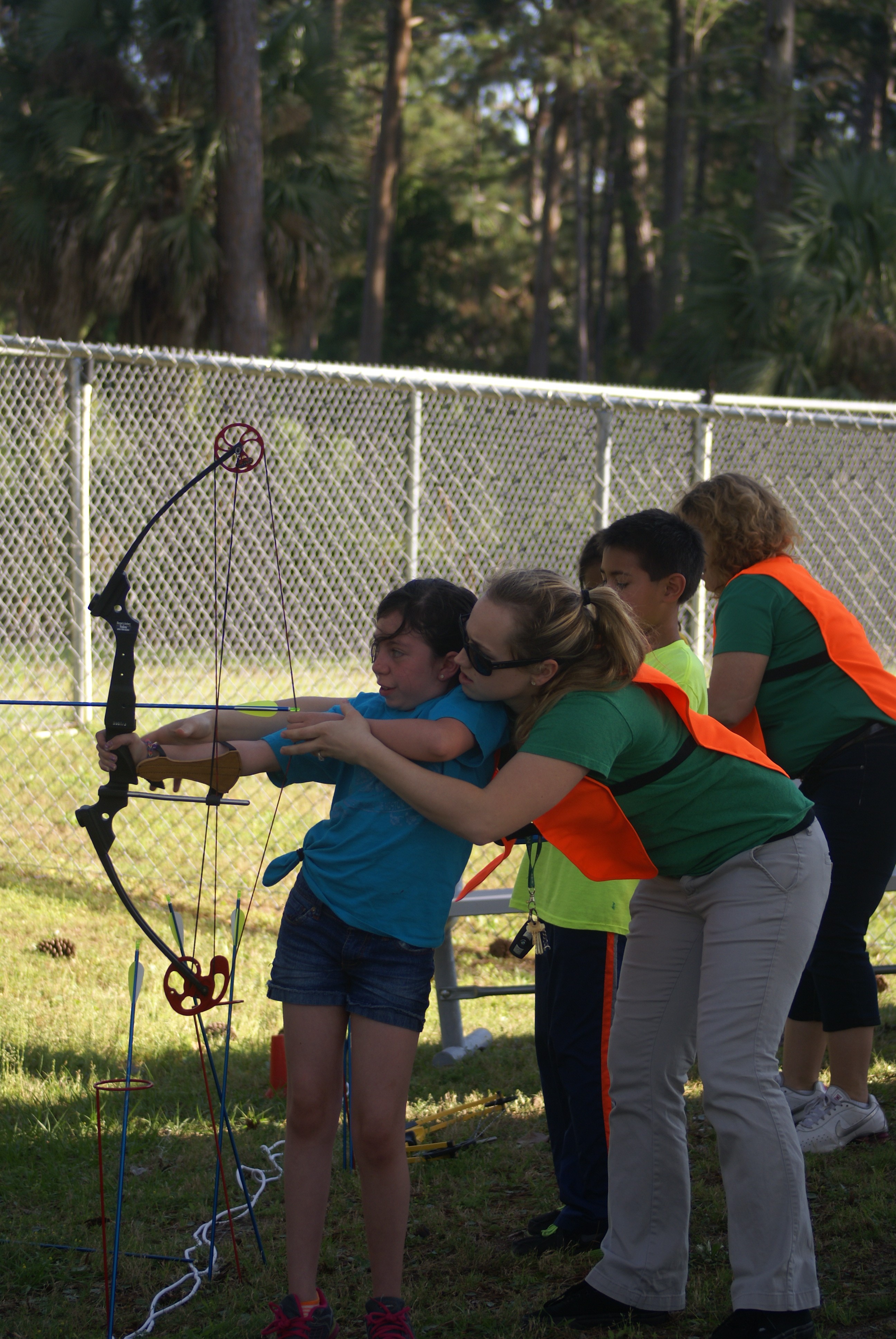
by pmdavis | Apr 16, 2015
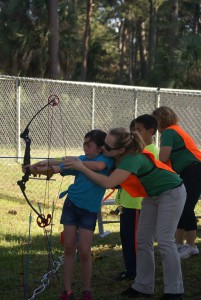
Volunteers insure that military youth have a consistent, quality 4-H experience.
April is the Month of the Military Child, and no Volunteer Appreciation Celebration would be complete without acknowledging our 4-H military volunteers. The team of volunteers and staff at the Naval Support Activity Youth Center in Panama City ensure that military youth have an opportunity to participate in a wide variety of 4-H Programs at their youth center. One of the newest programs they offer is the 4-H shooting sports project. The leadership team for this 4-H club include Ms. Alana, Mr. Cole, Ms. Heather, Ms. Jessica, Ms. Shelby and Ms. Tammy. To allow all interested youth to participate, they started multiple archery clubs that meet weekly helping new archers develop strength, accuracy, and discipline. A small competitive traveling team has also been organized to help youth improve their skills and potential of becoming competitive archers through their 4-H learning experiences.
Cole is a five year veteran 4-H volunteer who did not grow up in 4-H, but was drawn into the program by the opportunity to teach youth life and workface related skills through projects like archery, aerospace, film making, photography, outdoor cookery, robotics and rocketry. His favorite 4-H experience so far has been with the rocketry project: “The youth just really got into it! We learned about force, drag and flight. It was a unified project where everyone became involved and the learning just exploded. They were learning physics, science, and communication skills all at once. 4-H can really make a difference and cause youth to consider different careers too. It is really nice when you see a child that may be struggling in a different part of their life find their niche during one of the 4-H projects. You just see their confidence sky rocket and then carry over into their social confidence also.”
When talking with him recently he said that “4-H is conducive to relationship building while learning life skills allowing both youth and myself to grow. It gives us an organized meeting time with specific goals and direction allowing us to maximize our time and growth. It helps make a difference because it is the conduit running in the background to allow everything to happen. 4-H allows the flexibility of being able to try ideas, experience things and make their curricula work for my needs. The best part is that when youth leave here they have something consistent to look forward to at their next duty station. It provides youth with one consistent thing to look forward to. I feel like we are literally planting the seeds to help youth develop their life skills. The program is nationwide and can help with the many changes and challenges our youth face. We are an important cog in the wheel for navy youth.”
Cole offers advice for anyone thinking about working with 4-H and kids. “If you have even an inkling that you would enjoy working with youth, then do so! It can be very valuable to that child, to know someone cares about them. Your follow through with one child can make a great deal of difference in their life and be the encouragement they need to become something great. Quite often there are not enough role models and caring adults for today’s children. Take the 4-H challenge and help a kid today!”
Dr. Paula Davis, the Bay County 4-H Agent says, “I want to recognize that this 4-H club is truly a team effort. With so many youth involved, it definitely can’t be done with one just person. I really appreciate the teams diligence, enthusiasm, and willingness to try new things with 4-H. The quality of a youth’s 4-H experience to a large extent depends on the relationship built between the 4-H members and their volunteer leaders, and these are some of the best!”
Do you have a passion or expertise that you would like to pass on to the next generation? Consider becoming a 4-H volunteer- we offer a wide variety of opportunities to fit your interests and schedule. Contact your local UF IFAS Extension Office or visit http://florida4h.org/volunteers.
by Heather Kent | Apr 15, 2015
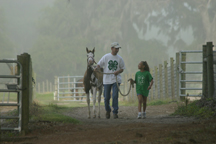
UF IFAS Photo
Last year, more than 4,000 youth participated in the Florida 4-H Horse Project. These youth would have never had the opportunity to learn horsemanship and leadership skills without horse project volunteers. Project leaders not only work with 4-H clubs, they often serve on committees to help plan and implement shows and other horse related events. In the Florida panhandle, twenty-three volunteers comprise the Area A 4-H Horse Advisory Committee. These volunteers plan and execute our district qualifying show (coming up this weekend in Marianna) as well as assist with the state horse show in Tampa. They also plan other horse project related events such as horse judging, showmanship clinics, nutrition seminars, 4-H Hippology and Horse Quiz Bowl.
“The Area A Horse Committee Volunteers are some of the most dedicated volunteers I have ever met,” shares Heather Kent, the regional 4-H agent. “Many of them have witnessed first-hand the potential of the 4-H horse program to help youth learn lifelong leadership and communication skills and they share a legacy of caring and compassion that influences every youth they work with.”
Terry Stout is one of those volunteers. Terry states, “I grew up in 4-H and FFA and when my daughters were old enough, they joined the Eglin Riding Stables 4-H Club to learn how to groom and care for their horses. 4-H was a large influence on them and now that they are alumni, they give back by teaching and helping the next generation of horse kids. I have learned a lot as a volunteer, and I am involved on many advisory boards because I know I can help most by being a voice for youth and other volunteers.”
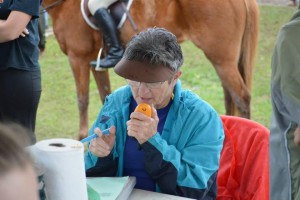
4-H volunteers plan and implement educational events at the club, county, district and even state levels. Escambia County 4-H Photo
Anne Peterson, a 4-H volunteer from Escambia County, says “I became involved with 4-H when my daughter was 10 years old. I have always wanted to protect our youth and see that they receive the best instruction possible for their horse project. In order to see this happen, I became involved in the local, area, and state horse program. Today I still see the need for volunteers to continue making the best better and as long as there is a need I want to help any way I can.” Anne was inducted to the Florida 4-H Hall of Fame in 2013 for her service as a volunteer.
Barry Hoffman, a Leon County volunteer, got involved in 1997 with the Trailblazers 4-H Club. Seeing a need for funds to help youth attend 4-H horse camp, Barry led a committee to organize a Horse Expo at the North Florida Fairgrounds to teach others about riding techniques, horse management, tack sales, and more. “Barry is always available to help with whatever is needed- which has even included helping me when by car broke down on the interstate on the way to a horse committee meeting. He continues to serve at the district level eleven years after his youngest son graduated from 4-H. Barry plays a major role in both the area and state horse shows, and is an incredibly valuable resource for us,” says Marcus Boston, the Leon County 4-H Agent.
Jean McMillian, a Gulf County volunteer, has been involved for more than 40 years. Roy Carter, the Gulf County Extension Director says, “Mrs. McMullian has led three generations of 4-H youth through the 4-H horse program. Her club, the Big River Riders 4-H Club, holds the county record for the longest running 4-H club and she is one of the strongest leaders we have ever had the pleasure to work with. She has been the backbone of our horse program and is always willing to help in any capacity.” Her son Russell is continuing the family tradition by being involved as the co-chair for the speed events for the area qualifying show.
Terry Harris has volunteered in both Jackson and Gadsden counties since the early 90’s, helping hundreds of youth with their horse projects. Angel Granger, the Jackson County 4-H Agent shares, “Even though his nephews are grown now, Terry continues to work tirelessly with 4-H and is a wonderful advocate for the program. We are very fortunate to have someone like him working at both the club level and serving as a member of the 4-H Area A Horse Advisory Committee.”
Lucy Notestine has been a volunteer for the last 8 years, and currently serves as the Area A Horse Advisory President. She, her daughter Shane Kenny and Dara Strickland raise over $2,000.00 each year to provide incentive awards for area horse show participants. Their 4-H Agent, Dr. Paula Davis says, “They realize that many youth are too young to advance to the state show therefore they work really hard to make the Area A Show a special event to encourage further participation and help the program grow.”
These stories have one very important thing in common- each of these volunteers has a heart for helping young people succeed. If you have a similar passion, consider becoming a 4-H volunteer. To find out how, contact your local Extension Office or visit http://florida4h.org/volunteers. If you are a parent or volunteer new to the 4-H Horse Project, Angel Granger,has developed a handy checklist to help you prepare for your next show. You can download the checklist and keep it in your show box or horse trailer so that you are always prepared to do your very best. If you laminate the list, you can use a dry-erase marker to check items off each time you pack your trailer.
Your opinion matters to us! Please complete this short survey so we can improve this blog https://ufl.qualtrics.com/SE/?SID=SV_3gtLKjqia3F75QN.
by amgranger | Apr 14, 2015
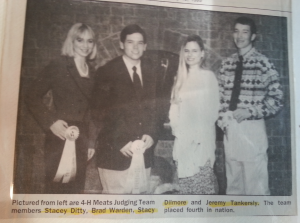
Brad and Stacey at the 1995 National 4-H Meats Judging Contest
Stacey (Ditty) Warden joined the Lovedale 4-H Club at the age of ten as a shy girl not knowing just how drastically 4-H would impact her life. She joined upon the recommendation of her aunt, who had just started working at the Extension Office as the new 4-H Secretary. One of Stacey’s first projects was poultry judging. A few years later, she met her future husband, Brad Warden, while attending the 4-H Ham and Hog workshop in Gainesville. Stacey and Brad showed cattle and participated on the 4-H Livestock, Poultry and Meats Judging teams at the county, state and national levels. They attribute their success to supportive parents as well as their former 4-H Agent, Shelia Andreason, who now works for Alabama 4-H. Shelia remembers their determination and dedication, “4-H was a safe place for kids to learn how to compete in a competitive world. Brad and Stacey easily mastered the vocabulary, points to evaluate, and steps to give a logical set of oral reasons and were able to transition from one judging topic to the next. I am very proud to see them coaching judging teams for Jackson County as alumni of the program 20 years later!”
Brad and Stacey also transitioned from childhood friends to teenage sweethearts. They married soon after high school graduation and have been married 18 years. They have two children, Hayden and Eden. Today, their son Hayden shows steers and participates in poultry, livestock, and meats judging. Eden is not yet old enough to join 4-H, but is a ‘future 4-Her in training.”
Last year, Brad and Stacey decided to start a 4-H club so that other youth (including their own) could benefit from 4-H the same way they did. “Kids need an outlet to learn about agriculture and livestock and we wanted to continue the strong tradition of livestock judging in Jackson County.” Their passion for 4-H is contagious. Their club is one of the fastest growing clubs in the county, with nearly 50 members. “It was a real eye opener to see how many youth and parents were attracted to learning about livestock. Many of them had never owned an animal or participated in a judging contest before joining 4-H. We were amazed at the response we got,” said Stacey.
One of the reasons that this club is so popular is because Brad and Stacey are passionate advocates for 4-H. They are quick to share why learning about agriculture is still relevant today, despite a decrease in the number of “farm kids.” Stacey shares, “Jackson County is an agricultural county. Kids need to know about agriculture in order to grow up to be informed consumers, stewards, and citizens. Poultry judging is a great way for kids to get started in agriculture. It teaches them about quality control, communication, and reasoning skills. The skills they learn are very practical and relate to everyday life. 4-H is a true testament to what the programs teach the youth. Once parents see what the kids are learning, they want their kids involved.”
“I tell parents all the time that I would not be the person I am today if I had not joined 4-H. I was a poor farm girl that had never been outside of Jackson County. 4-H helped me learn how to speak in front of others, build confidence, and gave me so many opportunities I would not have had otherwise. This is what is missing in other programs, which tend to just focus on fun activities. In 4-H, activities are fun, but they also help youth develop valuable life skills that will carry them through school and their future career. 4-H focuses on the big picture of positive youth development, and kids are hungry for that kind of learning because they can’t get it anywhere else.”
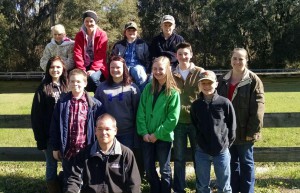
Brad and Stacey with members of their livestock judging team in 2015.
Brad and Stacey attribute the success of their club not only because of the content they teach, but also to a dedicated group of 4-H parents who are willing to pitch in and help out whenever needed. 4-H parents Stephen and Casey Roach shared, “We are so thankful that we have the opportunity to be a part of a 4-H club where the leaders get more excited about the kids’ accomplishments than the kids do! Brad and Stacey cheer on all the 4-H members and encourage them to do their best. They’ve done such a tremendous job that the kids are placing in competitions, gaining confidence, and learning valuable information about livestock. We couldn’t be happier or more appreciative of all that Brad and Stacey do for the Jackson County 4-H Livestock Club.”
There are no guarantees that you will meet your future spouse in 4-H, but you will reap benefits by sharing your passion and expertise as a 4-H volunteer! 4-H alumni like Brad and Stacey make ideal volunteers. Stacey advises “Jump right in- don’t hesitate! We were not sure about it at first, but with support from our 4-H Agent, other parents and the community, things have fallen into place. It is not nearly as intimidating as we thought it would be.” To find out how you can leverage your skills and experience as a 4-H volunteer, contact your local Extension Office or visit http://florida4h.org/volunteers.
Your opinion matters to us! Please take this short survey to help us improve our blog https://ufl.qualtrics.com/SE/?SID=SV_3gtLKjqia3F75QN.







